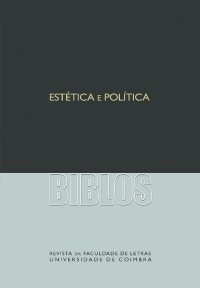Please use this identifier to cite or link to this item:
https://hdl.handle.net/10316.2/35509| Title: | A utopia sob o signo do poema herói-cómico: O balão aos habitantes da Lua (1819), de José Daniel Rodrigues da Costa, entre paródia e crítica social | Authors: | Ferro, Manuel | Keywords: | Utopia;Hero-comic poem;José Daniel Rodrigues da Costa;Parody;Socio-political fiction;Utopia;Poema herói-cómico;José Daniel Rodrigues da Costa;Paródia;Ficção sócio-política | Issue Date: | 2013 | Publisher: | Imprensa da Universidade de Coimbra | Abstract: | Utopia while a space of convergence of different literary vectors, such as
the hero-comic poem, parody, scientifi c fi ction and the historical essay, combines
in a concerted way a plurality of codes of diverse nature. In this multimode
atmosphere, as well indeed in the generality of all the utopian texts, in which
it is dreamed of a universe of fancy, in it projecting the best of the possible
worlds in the future, or, otherwise, in an alternative space, the socio-political
thought glitters.
Written by José Daniel Rodrigues da Costa, O Balão aos Habitantes da
Lua/The Balloon to the Inhabitants of the Moon is at the same time a hero-
-comic poem and a 19.the century utopia, centered on the narrative about a
travel undertaken by Robertson in a balloon that he himself had made. In a
utopian key, it is not really the rediscovery of (Campanella’s) “Sun City”, but
of the moon and its inhabitants, as well of its exemplar society, that displays
jocose and funny aspects, based on an anyway appropriate rationality.
Besides the place that it occupies within the 19.th century political thought,
it is doubtless a mark in the fi eld of the utopian expression of the ideal state,
molded in counterpoint with the human, social and political reality of our
country, which is projected as a negative image, according to the technique
of the photography, at the time in process of affi rmation and popularization.
In the poem, the mirage of a structured, fair and harmonic town, based on a
remarkable planning and on the experience of public happiness. Conciliating
the enunciated ideals with contingent reality, here it is outlined a model of a
singular town and state through the proposal of the combination of the utopian
substance with the author’s dreams and reveries of socio-political regeneration.
Thus, in a light style, the poet succeeds in discussing questions of the
fi eld of History and politics, in a close relation with social and educational
subjects, not unlike the way H. G. Wells proposes and, at the same time, raises
the “speculation about the sense(s) of History and the pathways of the future,
the search for happiness and the place of utopia in the route of Humanity”. On
the other hand, and at another level, it equates the operation of the binomial “the fi ction of History and the History of fi ction”, leading the reader to assess
the “lost capabilities […of] high expectations about the future”, outlined in
moments of the past. A utopia enquanto espaço de convergência de diferentes vectores literários, como o poema herói-cómico, a paródia, a fi cção científi ca e o ensaio histórico, conjuga de modo concertado uma pluralidade de códigos de diferente natureza. Neste contexto multímodo, como aliás em todos os textos utópicos em que se sonha com um universo de fantasia, nele projectando o melhor dos mundos possíveis no futuro ou, quiçá, num espaço alternativo, resplandece o pensamento sócio-político. Escrito por José Daniel Rodrigues da Costa, O Balão aos Habitantes da Lua é simultaneamente um poema herói-cómico e uma utopia oitocentista, centrado no relato de uma viagem feita por Robertson no balão que ele próprio construiu. Em clave utópica, não se trata propriamente do reencontro com a ‘Cidade do Sol’ (de Campanella), mas da Lua e seus habitantes, bem como de sua modelar sociedade, que não deixa de ostentar aspectos jocosos e divertidos, mas fundados numa racionalidade de algum modo pertinente. Para além do lugar que ocupa no âmbito do pensamento político do século XIX, trata-se, sem dúvida, de um marco no campo da expressão utópica do estado ideal, moldado em contraponto com a realidade humana, social e política do nosso país, que se projecta numa imagem ‘a negativo’, consonante a técnica da fotografi a, na época em vias de afi rmação e divulgação. No poema, a miragem da cidade estruturada, justa e de concórdia evidencia o carácter exemplar da orgânica da sociedade apresentada, fundada numa notável planifi cação e na vivência da felicidade pública. Conciliando os ideais enunciados com a realidade contingente, aqui se projecta um modelo de cidade e de estado singulares, mediante a proposta de articulação da substância utópica com os sonhos e devaneios de renovação político-social do autor. Num estilo aligeirado, o poeta consegue, assim, problematizar questões do campo da história e da política, em estreita articulação com temas educativos e sociais, de modo não muito diverso do que H. G. Wells propõe e, simultaneamente, suscitar igualmente a “refl exão sobre o(s) sentido(s) da história e os caminhos do futuro, a busca de felicidade e o lugar da utopia no percurso da humanidade”. Por outro lado, e a outro nível, equaciona o funcionamento do binómio “a fi cção na História e a História na fi cção”, levando ainda o leitor a avaliar as “possibilidades perdidas [… de] expectativas elevadas acerca do futuro”, delineadas em momentos do passado. |
URI: | https://hdl.handle.net/10316.2/35509 | ISSN: | 0870-4112 | DOI: | 10.14195/0870-4112_11_12 |
| Appears in Collections: | Biblos |
Files in This Item:
| File | Description | Size | Format | |
|---|---|---|---|---|
| biblos_xi_cap13.pdf | 4.34 MB | Adobe PDF |  |
Items in DSpace are protected by copyright, with all rights reserved, unless otherwise indicated.
